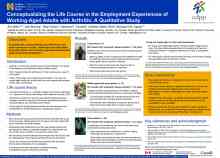This project examined the work experiences of young, (18-34 years), middle-aged (35-54 years) and older adults (55+ years) living with arthritis to determine the similarities and differences across the life course. We conducted semi-structured focus groups/interviews. Results found that the impact of arthritis on involvement in paid work is not uniform across the life course. Several key transitions were uncovered at different phases of life that were important in shaping employment. While young, middle-aged and older adults may require similar supports to sustain employment participation, accessibility to accommodations, modifications and health benefits within the workplace may differ. Life course theory is a valuable framework for explaining differences in employment participation.
A poster was presented at ACR/ARHP 2016:
Jetha, A., Bowring, J., Connelly, C., Tucker, S., Martin Ginis, K. A., Gignac, M. A. M. (September, 2016). Conceptualizing the life course in the employment experiences of working-aged adults with arthritis: A qualitative study. Poster presented at the Annual Meeting of the American College of Rheumatology/Association for Rheumatology Health Professionals, Washington, D.C.
A summary of the results can also be found
here: ![]() ArthrtisEmployment_StudyResults.pdf
ArthrtisEmployment_StudyResults.pdf

